Journal papers by Jan Vávra
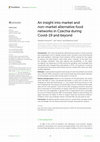
Frontiers in Nutrition, 2024
Introduction: The Covid-19 pandemic affected food systems in many countries and emphasized a lot ... more Introduction: The Covid-19 pandemic affected food systems in many countries and emphasized a lot of already existing social, economic and environmental agri-food problems. Alternative food networks (AFNs), praised for their ability to improve the food systems, were under stress, however, at the same time, the changed conditions may have opened new possibilities. In this paper we address the importance of AFNs during the pandemic and investigate how households have changed their participation in AFNs. Our research is novel by simultaneously focusing on both market and non-market AFNs which are often studied separately. Methods: A representative questionnaire study of Czech households was carried out in Autumn 2021 to provide a case study of food and consumption behavior of the European country after several waves of Covid-19. Results and discussion: Based on the responses of 515 participants, the results show that 68% of Czech households participate in some form of AFNs, be it shopping or food self-provisioning, i.e., non-market food procurement in the form of gardening. Focusing on the market AFNs, farmers' markets and farm gate sales are the most popular. Covid-19 and 2021 emerging economic pressures led to a decrease of consumption of organic food (22% of respondents) as well as fresh fruit and vegetables in general (10% of respondents) and a noticeable occurrence of food insecurity (18% of households). Based on these findings, the paper discusses the ability of AFNs to support food and nutritional resilience. Problems which may endanger market-oriented AFNs are discussed as well. Conclusion: By addressing both market and non-market AFNs, the paper brings new knowledge into the food environment and agri-food policies research.
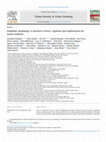
Urban Forestry & Urban Greening, 2023
There is a significant amount of evidence highlighting the health, wellbeing and social benefits ... more There is a significant amount of evidence highlighting the health, wellbeing and social benefits of gardening during previous periods of crises. These benefits were also evident during the COVID-19 pandemic. This paper presents a narrative review exploring gardening during the early stages of the COVID-19 pandemic to understand the different forms of gardening that took place during this crisis and key elements of this activity. Research about gardening during the pandemic focused on food (in)security and disrupted food systems, the health and wellbeing benefits of gardening, and the social dimensions of gardening. We offer three vignettes of our own research to highlight key insights from local, national and international perspectives of gardening during the pandemic. The paper’s conclusion outlines how researchers, policy makers and public health practitioners can harness what has been learned from gardening during the pandemic to ensure these benefits are more widely available and do not exacerbate already entrenched health inequalities in society.

Sociologia Ruralis, 2022
While alternative food networks (AFNs) have become the leading conceptualisation of sustainable f... more While alternative food networks (AFNs) have become the leading conceptualisation of sustainable food systems, vibrant scholarship on food self-provisioning (FSP) in Central and Eastern Europe has remained confined to the geopolitical region it investigates. This article brings these two bodies of thought closer together in two steps. First, we trace four framings of FSP deployed over the last three decades—coping strategy, cultural practice, hobby and source of good food and reading FSP as transformative practice—to demonstrate its progressive affinity with AFNs. Second, we follow the most recent framing in highlighting the material reality of local food production as a feature shared by both FSP and AFNs. From this perspective, FSP can be understood as a more radical variant of AFNs given its more substantial environmental and social impact (FSP is more widespread and socially inclusive and less dependent on market transactions). By uncovering the epistemological underpinnings of these different framings of FSP and exploring their implications for food practices on the ground, this article draws general lessons for scholarship aiming to advance food system transformation.
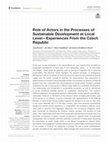
Frontiers in Sustainability, 2022
In this text we are interested in the preconditions for, and opportunities provided by sustainabl... more In this text we are interested in the preconditions for, and opportunities provided by sustainable evelopment at local level in non-metropolitan areas, i. e., in rural areas and villages. These areas are generally seen as having an important role in achieving sustainability. The literature review highlights the general principles of endogenous development with an emphasis on local resources including human potential and social capital, and the Czech context. In practice, the empowerment and cooperation of regional actors is crucial for the sustainable transition of rural areas; an analysis of the local situation was thus conducted from the perspective of social capital. Research primarily
questioned the role of local actors in different areas related to sustainable development, their relationships and involvement in sustainability processes, as well as deficiencies in social conditions creating barriers to sustainable development. The research methods selected to answer these questions reflected the context-specific, scientifically overlooked character of the theme of this research where emerging phenomena were at the center of our interest. A survey conducted with representatives of the National Network of Local Action Groups (LAGs) mapped the situation in 50 (out of 180) LAGs in the Czech Republic (28 % of the total number). Data were analyzed quantitatively
(single and multiple-choice questions), in combination with qualitative methods which were used to transform and aggregate responses into conceptual categories which were monitored for frequency (to observe majority opinion). The diversity of local actors, their relationships and roles in the sustainable development processes was thus illustrated. A snapshot of actors’ current involvement in specific areas of sustainable development was compared with their potential involvement in these areas illustrating the importance of social capital which is not always recognized in relevant policy
documents. The engagement of these diverse actors in sustainability transition processes is less evident: in most of the categories of change, the role of public administration prevails. According to the respondents, these changes that would ensure a sustainable future of the regions are often not taking place. While some of these findings may be specific to geographically-defined regional conditions and the Czech historical context, the research raised theoretically relevant questions concerning the role of social capital in sustainability processes.
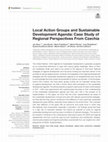
Frontiers in Sustainability, 2022
The United Nations' 2030 Agenda for Sustainable Development is generally accepted as an overarchi... more The United Nations' 2030 Agenda for Sustainable Development is generally accepted as an overarching framework to cope with various global challenges. Many of them are manifested locally and need to be solved at the regional or local level. National strategies of regional development and top-down funding are important drivers of the activities of various regional actors. However, the integration of the regional development strategies and the sustainable development agenda is not straightforward and may fail to acknowledge the local context and potential for bottom-up activities. In the European Union's (EU) context, the local action groups (LAGs) are an important driving force of regional development, but little is known about their perception of the sustainable development agenda. The article presents a research case study of Czech LAGs realized in 2021. LAGs were approached with questionnaires focusing on their understanding of the sustainable development agenda and their own role in the process of its implementation. In this paper, we show that the LAGs' representatives are aware of the sustainable development concept and work with relevant governmental strategies, but they feel that they cannot contribute to the fulfillment of many particular sustainable development goals (SDGs), especially those related to the environment. This contrasts with their reflection of the goals with an economic and social focus in which they feel relatively more empowered, especially in education. Our findings reveal that there is a high risk of mismatch between the bottom-up potential of LAGs for regional sustainable development and top-down conditions of national strategies. The results of the research contribute to the contemporary discussions about the SDGs and regional development and thus could be used by both academics and practitioners. Notably, national policymakers and regional authorities could benefit from our insights into LAGs' perspective of SDGs' implementation.
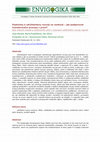
Envigogika, 2021
Východiskem úvah o strategiích udržitelnosti regionálního rozvoje jsou Cíle udržitelného rozvoje ... more Východiskem úvah o strategiích udržitelnosti regionálního rozvoje jsou Cíle udržitelného rozvoje (SDGs) a jak se promítají na místní úroveň. Článek soustřeďuje pozornost na cíl č. 4 – vzdělávání, které může významně podporovat implementaci dalších cílů, pokud cílí na důležité aktéry udržitelného rozvoje. Tuto (transformativní) roli by mělo vzdělávání plnit i na místní úrovni, což ovšem strategické rozvojové dokumenty plně nezohledňují, oblast celoživotního učení není systémově řešena vůbec. Cílem výzkumu bylo zmapovat aktuální situaci v regionech ČR a zjistit, jakou úlohu vzdělávání na místní úrovni v kontextu udržitelného rozvoje plní (a mělo by plnit), a jaké jsou v této souvislosti role jednotlivých aktérů rozvoje venkova. Otázky, které si řešitelský tým kladl v rámci školení pro představitele místních akčních skupin (MAS), byly formulovány a následně distribuovány formou plošného dotazníkového šetření mezi manažery/manažerkami MAS. Data byla vyhodnocena kvantitativními a především kvalitativními metodami, s důrazem na jedinečné zkušenosti a postřehy. Z výsledků vyplývá, že místní aktéři (reprezentovaní MAS) si uvědomují potřebu vzdělávání i nedostatky v této oblasti, a chápou též důsledky tohoto stavu pro udržitelný rozvoj v environmentální, ekonomické i sociální oblasti. Potenciál jednotlivých aktérů (jejich role v procesech udržitelnosti) zůstává nevyužit, což ovlivňuje schopnost inovací. Ačkoli jsou MAS aktérem, který svou roli spatřuje především v posilování sociálního kapitálu a dalších předpokladů rozvoje včetně vzdělávání, existují překážky exogenního charakteru, které naplnění této role brání. Součástí možných řešení je posílení leadershipu MAS v otázkách udržitelnosti, a to i prostřednictvím vzdělávání; vytvoření systému celoživotního učení, které využívá místní znalosti; a zapojení expertů nejen v oblasti technologií, ale například též odborníků na otázky sociální. Vymezení rolí jednotlivých aktérů v procesech rozvoje na úrovni regionů (a tím i specifik bottom-up procesů), by přispělo i k vyjasnění toho, jaké top-down podněty jsou nezbytné k prosazování veřejného zájmu, vyjádřeného např. v SDGs.
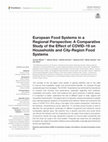
Frontiers in Sustainable Food Systems, 2022
The concept of the city-region food system is gaining attention due to the need to improve food a... more The concept of the city-region food system is gaining attention due to the need to improve food availability, quality and environmental benefits, for example through sustainable agri-food strategies. The COVID-19 pandemic has reinforced the importance of coherent and inclusive food governance, especially regarding food resilience, vulnerability and justice. Given that evidence from good practices is relatively sparse, it is important to better understand the role of different types of cities, regions and household characteristics. The paper's aim is to describe, analyze and attempt to explain (sub-national) regional variations of household food behavior before and during the first wave of COVID-19 in 2020 using a city-region food system perspective. Informed by the literature, comprehensive survey data from 12 countries across Europe is used to describe the pre-pandemic landscape of different household food behaviors across comparable regional types. We examine how a specific economic and social shock can disrupt this behavior and the implications for city-region food systems and policies. Conclusions include the huge disruptions imposed on income-weak households and that the small city scale is the most resilient. Proposals are made that can strengthen European city-region food system resilience and sustainability, especially given that future shocks are highly likely.
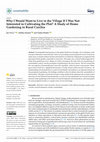
Sustainability, 2021
Unsustainable food practices in the global North have brought a lot of attention to the concept o... more Unsustainable food practices in the global North have brought a lot of attention to the concept of alternative food networks. However, prevailing research perspectives have focused on urban areas or market-related activities and tended to overlook the widespread yet neglected food growing in home gardens, especially in rural areas. This paper uses a mixed method approach to study home gardening in two villages in Czechia, focusing on the state of the art of gardening, its sustainability context, and the perception of gardening by the local citizens. We have found that the vast majority of households grow fruit and vegetables, while livestock is also present. Home grown food, which has a supplemental character, is mostly shared within networks of relatives. An understanding of food production as a part of rural identity and tradition is an important element of the perception of gardening. Our findings contribute to the rich debates about the sustainability of food systems. The paper is innovative because it steps outside of the typical poverty or food security discourse of rural informal food production, as well it reveals information on livestock breeding, discusses home gardening in the context of rural development and food policies, and emancipates the semi-peripheral locality as a regular source of new knowledge.
Geografické rozhledy, 2019
Zahrádkaření dlouho stálo mimo pozornost sociální geografie i jejích subdisciplín, jako jsou geog... more Zahrádkaření dlouho stálo mimo pozornost sociální geografie i jejích subdisciplín, jako jsou geografie zemědělství nebo geografie jídla. V tomto textu ukazujeme, že geografický výzkum této na první pohled nenápadné činnosti má co nabídnout do řady diskuzí o klíčových tématech současnosti. Domácí produkce potravin je mimo jiné důležitou součástí celostně chápané, nejen kapitalistické ekonomiky a současně přispívá ke kultivování mezilidských vztahů a environmentální udržitelnosti.
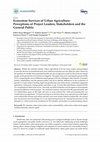
Sustainability, 2020
Within the scholarly debate, Urban Agriculture (UA) has been widely acknowledged to provide diver... more Within the scholarly debate, Urban Agriculture (UA) has been widely acknowledged to provide diverse environmental and socio-cultural ecosystem services (ESs) for cities. However, the question of whether these potential benefits are also recognized as such by the involved societal groups on the ground has not yet been investigated. This paper aims at (1) assessing the perceived ESs of UA, comparing the views of different societal groups in the city of Bologna, Italy (namely: UA project leaders, stakeholders and the general public) and (2) to identify differences in the evaluation of specific UA types (indoor farming, high-tech greenhouses, peri-urban farms, community-supported agriculture, community rooftop garden and urban coop). In total, 406 individuals evaluated 25 ESs via a standardized Likert-scale survey. The study unveiled similarities and divergences of perceptions among the different societal groups. The statistical analysis indicated that the general public and UA stakeholders agree on the high relevance of socio-cultural ESs, while provisioning ESs was considered as less significant. UA types focusing on social innovation were expected to provide higher socio-cultural ESs whereas peri-urban activities were more closely linked to habitat ESs. We assume that involvement and knowledge of UA are determining factors for valuing the provision of ESs through UA, which needs to be considered for ES valuation, particularly in a policymaking context.

Journal of Cleaner Production, 2020
Cities have become major contributors to sustainability problems and, in the meantime, seedbeds f... more Cities have become major contributors to sustainability problems and, in the meantime, seedbeds for sustainability transformation. Urban nature-based solutions, such as greening strategies that foster urban food production as a cross-cutting issue, promise to have multidimensional benefits for sustainable urban development. However, a conceptual understanding of interlinkages between nature-based solutions and their contribution to sustainability transformation is lacking. The goals of this study are twofold. First, to develop a conceptual model for testing multi-dimensional impacts of urban nature-based solutions supporting social-spatial, social-ecological and individual sustainable transformation. The model has been developed based on the concepts of place attachment, human-food connection and pro-environmental food behaviour. Second, the conceptual model is applied to the example of edible cities. Edible cities can be considered an innovative nature-based solution that provides multiple co-benefits by offering (free) food for urban residents in public spaces. A Principal Component Analysis of a survey among residents of Andernach (N = 380), one of the first edible cities in Germany revealed, in contrast to the conceptual three-dimensional model, a four-dimensional model with high construct validity and reliability. The model comprises a) place attachment, b) experiential and c) material human-food connection as well as d) pro-environmental food consumption. Items of internal emotional and philosophical human-food connection included within the pro-environmental food consumption scale suggested their important role in fostering sustainability. Results suggest that the edible city can be considered a strategy for increasing urban attractiveness and place identity, supporting social bonding and experiential human-food connection by using the edible areas for nature observation and recreation. However, although the residents are well informed about the edible city concept, most residents are not actively involved and rarely use the food provided by the edible city. Thus, they also could not answer questions related to cognitive human-food connection such as estimating the food’s taste and health quality. To strengthen material and cognitive human-food connection, policy implications of the results propose the implementation of accompanying information and participation activities. By linking nature-based solutions with sustainability transformation, this study provides conceptual and practical implications for the multidimensional benefits of innovative urban greening strategies such as edible cities.
Canadian Journal of Development Studies, 2019
Resilience and food self-provisioning (FSP), terms that until recently were deployed primarily in... more Resilience and food self-provisioning (FSP), terms that until recently were deployed primarily in the study of livelihoods in the Global South, are now attracting attention from alternative food scholarship in the Global North. Drawing on a large-scale survey conducted in the Czech Republic, this article investigates FSP as a social resilience-enhancing set of practices. In addition to the traditional reading of FSP as a passive, defensive and crisis-deflecting form of resilience, this article puts forward an alternative conceptualisation of resilience as a proactive, preventative, future-oriented and transformation-enabling capacity that runs counter to the tenets of neoliberalism.

Land Use Policy, 2019
Soil erosion by water is the most common cause of land degradation and traditionally coincides wi... more Soil erosion by water is the most common cause of land degradation and traditionally coincides with agricultural production. This paper presents the results of a sociological case study comparing the perceptions of soil erosion of stakeholder groups from southern Moravia, an intensive agricultural and erosion-prone region in the Czech Republic. The research documents and analyses perceptions of erosion, perceived causes, and attitudes towards possible corrective measures. Altogether, 216 stakeholders consisting of farmers and local leaders (mostly mayors and vice-mayors) took part in a questionnaire survey between the years of 2012–2015. The results show that the stakeholders as whole are in general aware of the seriousness of the problem and see irresponsible farmers, lack of organic fertilizers and climate change as the major causes. Overall most preferred erosion mitigation measures were the growing of appropriate crops and the splitting of large fields into smaller ones. The views of farmers and local leaders are compared and discussed within the framework of the changing roles of rural areas. A productivist paradigm and corresponding modulation of erosion is significantly more prevalent among farmers, although not the dominant viewpoint in this group. The socio-economic context of soil erosion and recent trends in Czech soil conservation policies are discussed and it is argued that the local stakeholders are supportive of pro-environmental measures despite a lack of effort on the governmental and legislation level.

Food self-provisioning, also labelled as household food production, is a traditional activity per... more Food self-provisioning, also labelled as household food production, is a traditional activity persisting in the countries of the Global North. Recently, it has become an object of sustainability oriented research due to the positive social, health and environmental outcomes. However, little is known about the rate of self-sufficiency of the food self-provisioners and about environmental context of this kind of food production, including its actual potential for the reduction of greenhouse gas emissions. To clarify these topics, we analysed sociological data from a quantitative research study carried out in the Czech Republic in 2015. The data from 775 food growing households were used. The combined rate of self-sufficiency of the households was calculated as the share of home grown fruit, vegetables and potatoes in the overall consumption of the household. The rate of self-sufficiency (33%) was then compared with average food consumption and multiplied by the different values of greenhouse gas emissions reduction potential of home grown food. This led to the reduction of 42–92 kg CO2eq/person/year, which constitutes 3–5% of overall food emissions of Czech households. The research shows that positive environmental effects are not negatively counterweighted either by excessive use of industrial fertilisers or by car transportation to the gardens. Environmental motivation is unimportant for gardeners. Our findings give support to “quiet sustainability” and “sustainable materialism”, two recently advanced concepts highlighting the importance of considering everyday practices in the quest for sustainability.
Allotment gardens have played a significant role in Czech and Slovak society for decades, buildin... more Allotment gardens have played a significant role in Czech and Slovak society for decades, building upon a rich history of gardening. This article elaborates on Czech and Slovak allotments in the European context and identifies their core functions, services, and benefits. We provide a thorough historical review of allotments in this region, reaching back to the eighteenth century to trace significant periods and historic events that shaped society in general and urban gardening in particular. We analyze the development of allotments until and after 1989 and illustrate key aspects of their present situation using case studies and examples. The article provides a complex historical narrative as a good basis for discussions on contemporary trends, challenges, and visions for the future of urban allotment gardening in both countries.

This article presents the results of an international comparative study on food self-provisioning... more This article presents the results of an international comparative study on food self-provisioning, an activity still widespread in the countries of the Global North. We collected the data in a sociological survey done in 2010 as a part of the household energy use research project GILDED. We selected a region with urban and rural areas as a case study in each of the five EU countries, including Scotland, the Netherlands, Germany, the Czech Republic, and Hungary. Our article raises two main research questions: (1) What is the level of food self-provisioning in the regions? (2) Who participates in it? Additionally, we inquired into the motivations of self-provisioners using the results of analyses of sociodemographic and food consumption habits for their interpretation. We found that the level of self-provisioning varies considerably among the regions. Its share ranges from 13 percent in Dutch urban areas to 58 percent in German rural areas. The effects of some sociodemographic and geographic factors differ significantly among the countries. However, we can summarize that living in one's own property, living in a house or in a rural area, having a partner or children, being retired, or having a low income increases the probability of food self-provisioning.

The paper presents results of a study of heating habits (particularly the reported temperature in... more The paper presents results of a study of heating habits (particularly the reported temperature in the living room during the heating season) in three EU regions: Aberdeenshire in Scotland, Brandenburg state in Germany, and South Bohemia in the Czech Republic. Data were collected using a questionnaire study carried out in 2010. There were approximately 500 respondents in each region. Three types of data are analysed: socio-demographics (including gender, age, education, income); housing characteristics (e.g. type, size, insulation, heating system), and attitudes towards energy and environmental issues (perception of climate change and perceived self-efficacy of energy saving). The results show some explanatory power of income, house insulation, age, place of living and self-efficacy on people’s reported living room temperatures. The biggest differences were found, however, between the three regions. Scottish households report the lowest average temperature (18.9°C), Germans higher (20.7°C) and Czechs the highest (21.7°C). We also discuss the role of the local climatic conditions and put the results (especially the negligible role of most socio-demographics and housing characteristics) into the framework of theory of social practice and discussions about the limits of traditional sociopsychological ABC models (attitude-behaviour-choice) of pro-environmental behaviours.

A shift from flood protection to flood risk management is occurring in many Western countries, bu... more A shift from flood protection to flood risk management is occurring in many Western countries, but less is known about the social perception of floods and flood management changes in Central and Eastern Europe. The objective of this paper is to study the social perception of selected water-related issues and to find possible compatibilities with existing flood management. A sociological survey was conducted within a local population living in floodplains in South Bohemia (N=89). The results are discussed in relation to changes in Czech flood management governmental policies over the last 15 years. We conclude that the local population accepts floods as regular events, expects their increased frequency and prefers natural measures of flood mitigation. Czech flood management governmental policies are moving from flood defence and hard structural measures (e.g. dams) to flood risk management and more natural solutions (polders, free spill, etc.). However, there is still a strong legacy of a top-down approach in governmental policies which hinders full incorporation of local perceptions into flood management.

The paper deals with daily print media coverage of climate change in the Czech Republic in time p... more The paper deals with daily print media coverage of climate change in the Czech Republic in time period 1997–2010. Together 5663 articles from six countrywide daily newspapers, including four prestige-press, one tabloid and one political party affiliated newspapers, were chosen for the content analysis focused on the intensity of media coverage. Several categories were also observed, with special attention
to the quality of information and its possible consequences. This study is the first long-term content analysis of media depiction of climate change in the Czech news. The results show that intensity of media attention in the Czech newspapers is similar to other EU or US daily newspapers. Regarding the observed categories, the articles in Czech papers mostly do not refer to scientific sources of information, focus more on the natural issues than social ones and equally link the climate change topics to the Czech Republic and global issues. Most of the articles can be labelled as catastrophic or sensational, only 11 % of them are serious, i.e. not stressing the sensation or catastrophes and referring to some source of
information. With respect to this problematic quality of information we discuss previous studies dealing with the effect of information form on the recipients. Despite the fact, that people perceive the media in various ways, some studies show that catastrophic messages can increase the climate scepticism and undermine the willingness to act in some mitigation processes. We argue that the style of media coverage can influence public perception of climate change, which could partially explore, why the Czech population belongs to those more sceptical among the EU.

In our quantitative case study we deal with the sample of respondents from the Czech Republic, th... more In our quantitative case study we deal with the sample of respondents from the Czech Republic, their assessment of climate change, carbon footprint of their households and relationship between their opinions and CO2 emissions. Individuals and households are important participants in climate mitigation process – households produce substantial part of CO2 emissions in Europe; in addition, any political and economic climate change mitigation policy must be supported by public to be successful. According to our concept of cultural ecology, we try to find links between the culture and environment, i.e. between people’s mindset, their behaviour and its environmental impact. We made quantitative questionnaire survey in Spring 2010 with the sample of respondents from South Bohemian Region. Respondents were asked, among other questions, on their assessment of climate change (questions on causes, consequences, trustworthiness, etc.). They also received CO2 calculator, part of the questionnaire in which they filled energy consumption of their household in different categories: heating, electricity, car using, public transport, flights and food consumption. For our analysis we constructed one indicator from climate change opinions, so-called climate change awareness. This construct shows how important the climate change is for the respondents. Following our own methodology we calculated CO2 emissions of the households in different sectors. Then we investigated the correlation of climate change awareness and socio-demographic characteristics as well as climate change awareness and households’ carbon emissions. The climate change awareness is influenced by the number of people in household and living area (urban or rural). The effect of gender, age or education is not significant. Households produce most emissions by heating and food consumption. Public transport and flights emissions are very low. The only emission group in which the carbon footprint correlates with climate change awareness is heating, however this is due to the number of people in the household. There is no correlation for other groups. Emission footprint is probably influenced by other factors which cannot be captured due to the limited space of this paper. Detailed analysis of relations between different groups of household emissions and different demographic characteristics (age, gender, education, living area, income), type of housing (house, flat), values or lifestyles is challenge for future research and analyses.

Uploads
Journal papers by Jan Vávra
questioned the role of local actors in different areas related to sustainable development, their relationships and involvement in sustainability processes, as well as deficiencies in social conditions creating barriers to sustainable development. The research methods selected to answer these questions reflected the context-specific, scientifically overlooked character of the theme of this research where emerging phenomena were at the center of our interest. A survey conducted with representatives of the National Network of Local Action Groups (LAGs) mapped the situation in 50 (out of 180) LAGs in the Czech Republic (28 % of the total number). Data were analyzed quantitatively
(single and multiple-choice questions), in combination with qualitative methods which were used to transform and aggregate responses into conceptual categories which were monitored for frequency (to observe majority opinion). The diversity of local actors, their relationships and roles in the sustainable development processes was thus illustrated. A snapshot of actors’ current involvement in specific areas of sustainable development was compared with their potential involvement in these areas illustrating the importance of social capital which is not always recognized in relevant policy
documents. The engagement of these diverse actors in sustainability transition processes is less evident: in most of the categories of change, the role of public administration prevails. According to the respondents, these changes that would ensure a sustainable future of the regions are often not taking place. While some of these findings may be specific to geographically-defined regional conditions and the Czech historical context, the research raised theoretically relevant questions concerning the role of social capital in sustainability processes.
to the quality of information and its possible consequences. This study is the first long-term content analysis of media depiction of climate change in the Czech news. The results show that intensity of media attention in the Czech newspapers is similar to other EU or US daily newspapers. Regarding the observed categories, the articles in Czech papers mostly do not refer to scientific sources of information, focus more on the natural issues than social ones and equally link the climate change topics to the Czech Republic and global issues. Most of the articles can be labelled as catastrophic or sensational, only 11 % of them are serious, i.e. not stressing the sensation or catastrophes and referring to some source of
information. With respect to this problematic quality of information we discuss previous studies dealing with the effect of information form on the recipients. Despite the fact, that people perceive the media in various ways, some studies show that catastrophic messages can increase the climate scepticism and undermine the willingness to act in some mitigation processes. We argue that the style of media coverage can influence public perception of climate change, which could partially explore, why the Czech population belongs to those more sceptical among the EU.
questioned the role of local actors in different areas related to sustainable development, their relationships and involvement in sustainability processes, as well as deficiencies in social conditions creating barriers to sustainable development. The research methods selected to answer these questions reflected the context-specific, scientifically overlooked character of the theme of this research where emerging phenomena were at the center of our interest. A survey conducted with representatives of the National Network of Local Action Groups (LAGs) mapped the situation in 50 (out of 180) LAGs in the Czech Republic (28 % of the total number). Data were analyzed quantitatively
(single and multiple-choice questions), in combination with qualitative methods which were used to transform and aggregate responses into conceptual categories which were monitored for frequency (to observe majority opinion). The diversity of local actors, their relationships and roles in the sustainable development processes was thus illustrated. A snapshot of actors’ current involvement in specific areas of sustainable development was compared with their potential involvement in these areas illustrating the importance of social capital which is not always recognized in relevant policy
documents. The engagement of these diverse actors in sustainability transition processes is less evident: in most of the categories of change, the role of public administration prevails. According to the respondents, these changes that would ensure a sustainable future of the regions are often not taking place. While some of these findings may be specific to geographically-defined regional conditions and the Czech historical context, the research raised theoretically relevant questions concerning the role of social capital in sustainability processes.
to the quality of information and its possible consequences. This study is the first long-term content analysis of media depiction of climate change in the Czech news. The results show that intensity of media attention in the Czech newspapers is similar to other EU or US daily newspapers. Regarding the observed categories, the articles in Czech papers mostly do not refer to scientific sources of information, focus more on the natural issues than social ones and equally link the climate change topics to the Czech Republic and global issues. Most of the articles can be labelled as catastrophic or sensational, only 11 % of them are serious, i.e. not stressing the sensation or catastrophes and referring to some source of
information. With respect to this problematic quality of information we discuss previous studies dealing with the effect of information form on the recipients. Despite the fact, that people perceive the media in various ways, some studies show that catastrophic messages can increase the climate scepticism and undermine the willingness to act in some mitigation processes. We argue that the style of media coverage can influence public perception of climate change, which could partially explore, why the Czech population belongs to those more sceptical among the EU.
This chapter focuses on the energy demand and carbon footprint of the households from South Bohemia Region in the Czech Republic. The data were collected in the questionnaire survey conducted in Spring 2010. Together we collected 500 questionnaires with the information about the households’ energy relevant behaviour. We constructed our own carbon footprint calculator, inspired by the CO2 Rechner, official German carbon footprint calculator developed by the Federal Environment Agency. The methodology was adapted to the Czech conditions. Based on the data collected we calculated the average carbon footprint of the households, which means the amount of carbon dioxide produced per capita per one year. We focused on six categories: heating, electricity, car using, public transport, flights and food consumption. The emissions from heating are most important, food consumption, electricity and car using also show high carbon footprint. On the other hand, emissions from public transport or flights are very low in average. There is a biggest difference between rural and urban households in term of carbon emissions form electricity demand. Exploring our empirical data and preparatory State energy conception we try to estimate the trends in carbon emissions of households in the Czech Republic.
All chapters can be downloaded here:
http://www.ecoology.org/english/publications/ce-challenges
Monotematické socio-environmentální číslo časopisu AUC.